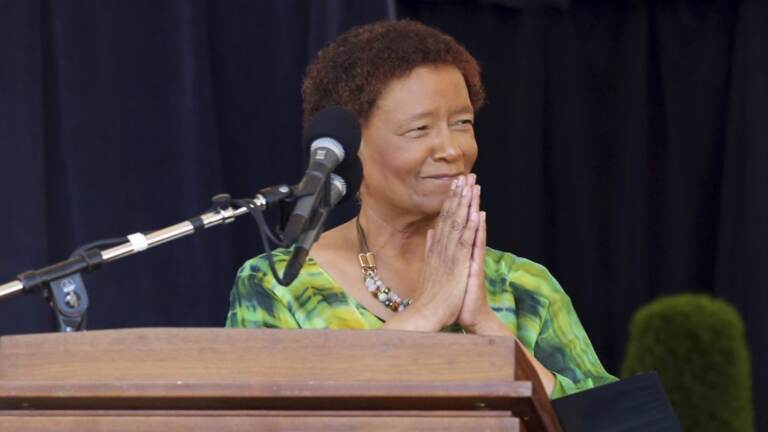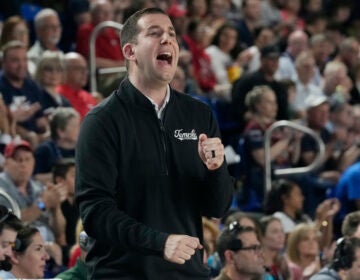‘Wow, Mom’: Claire Smith reflects on new sports media center at Temple bearing her name
Claire Smith discusses on the road to this new honor with another barrier-breaking Black woman sports journalist, WHYY’s Annette John-Hall.
Listen 4:58
Claire Smith at her induction into the National Baseball Hall of Fame in 2017. (Reed Saxon/AP Photo)
Claire Smith is a barrier breaker. In 2017, she was the first and only woman to receive the Baseball Writers’ Association of America Career Excellence Award, and the first woman sportswriter honored by the National Baseball Hall of Fame.
And now, another honor for the Temple University alum. Temple’s Klein College of Media and Communication has announced plans for the Claire Smith Center for Sports Media to help train the next generation of sports journalists. Smith will help lead the center.
She spoke to WHYY’s Annette John-Hall about the honor. The two are old friends, having been among the nation’s first women sports journalists in the 1980s and ‘90s.
Note: This transcript has been edited for length and clarity.
—
How did it feel to have the Claire Smith Center for Sports Media at Temple University named after you?
First, I was speechless. I think Dean David Boardman feared they’d have to pick me up off the floor. We were having lunch and the last tidbit was, “We’d like your permission to name the center after you.” Oh, I had a million thoughts, but first and foremost was, “Wow, Mom, our alma mater’s doing this.” My mother started at Temple, but had to transfer to Morgan [State University in Baltimore] after her father passed away. It was less expensive to go there. But she walked these streets in and around this campus. It gave her a great path to her chemistry profession … And then I thought of every single person, including you, who has walked by my side … And every time I saw a woman fighting and striving for the right just to write about games, it just really, really bolstered me.
The center will be allowing students to earn a certificate in sports media. What can they expect to learn as they earn that certificate?
Well, with people like me, they’re going to teach me how to keep looking forward because we haven’t seen what they’re going to have to know to succeed in these instances. We do a lot of history. “Well, around 1947 this happened and in 1962, this happened,” but they don’t really care about that. They care about how will we integrate social media with journalism or with public relations or with working for teams? Athletes are going to have their own publications and their own staffs. How do we integrate that and teach them how to hold on to the ethics and morals 101 that journalism schools try to instill in their graduates? It’s going to be fun because we’re building something from the ground up. It’s exciting. Some of the ideas are great — how to help teams meet their “summer of George Floyd commitments” and integrate into the societies around them, that sort of thing.
You said something that I’m curious about and that is how to fulfill your George Floyd commitments. What did you mean by that?
Well, there was a lot of introspection last year, after all the horrible incidents that left dead bodies of young Black men and women across the country. And almost every outlet, every sports organization, every team vowed to look inward and see what they can do, especially in underserved communities. All around them, kids wearing Dodgers and Phillies jerseys, they are constituents, too, even if they can’t afford your tickets. We have you look to them and say, “We appreciate you and we want to help you survive and thrive.” So that’s why Major League Baseball and the players’ associations from hockey and baseball are so involved in this as benefactors, because it’s part of their commitment to really focus on diversity, inclusion, and giving back to underserved communities.
North Philadelphia is a great example of what we all need to focus on, and also with Temple sitting in the middle of what the possible is. It’s a beautiful university and giving back to the community around it,not just gobbling up North Philadelphia, but trying its best to be a great neighbor. And that’s what we want to do.
The main focus of the center will be breaking down the barriers of gender and race in sports media, as you did. You know, the baseball clubhouse is a very insular, misogynist place … Tell us about the struggles that you had early on, just trying to get access.
It was 1984. With assurances from that league, I was sent to cover the Cubs and Padres League Championship Series. So in doing my job, I went down to the Padres clubhouse. I went into the clubhouse with the 50 or so other reporters and then was rudely pushed out. Literally, someone had their hand on my back, pushing me through the door as I was being pushed out … And so I’m standing in the dank, awful tunnel at Wrigley Field wondering how I’m going to do my job because you need both sides of the story. And another reporter came by. He saw immediately. He sized up the situation. He said, “What do you need?” And I said, “I need quotes.” He goes, “Who we want?” Well, they already said the starting pitcher wasn’t coming out to talk to me. So the first name that came to mind was Steve Garvey.
Steve was surrounded by the media, as he usually is, because after his team loses he shows up. The reporter told him where I was and what had happened. Steve excused himself from the throng and came out into the tunnel. And he said, “OK, OK, I’ll stay here for as long as you need, but remember you have a job to do.” And it was the most important thing anybody had ever said to me. And to this day, it’s the most important … I was at a crossroads. I am not a brave person. And he showed me the importance of staying the course, staying on the right path. The next day, Peter Ueberroth, brand new to the job of Commissioner (of Baseball), opened clubhouses universally. He said if the person is properly credentialed, no team can throw that person out of the clubhouse or harass him or her. And it’s been that way ever since.
Forty years later, there are issues, but we’re in there now. You go into a locker room and it’s heavily populated with both genders.
What’s your hope for students who are going to go through the Claire Smith Center for Sports Media, not only for their sports media knowledge, but for themselves?
I would hope that they come out with a strong belief of self. I don’t want them to come out and having been remolded into a robotic, cliche, question-spouting person, who perhaps does the makeup perfectly — and that’s not a gender thing because men wear makeup, too … I look in the mirror after work and I ask my parents if I made them proud that day. And did I do the right thing? And that’s all you need to do. These are foundational building blocks to build something special and that something special is the student who’s about to be in journalism and become a leader.

Get daily updates from WHYY News!
WHYY is your source for fact-based, in-depth journalism and information. As a nonprofit organization, we rely on financial support from readers like you. Please give today.






